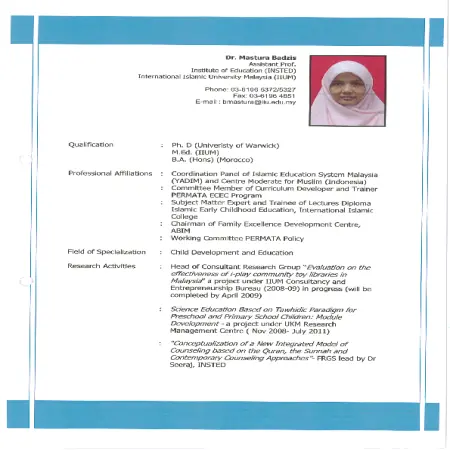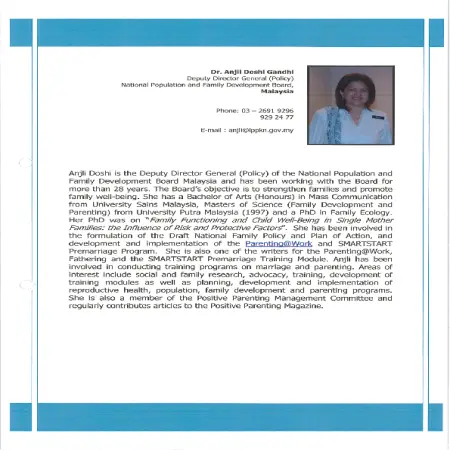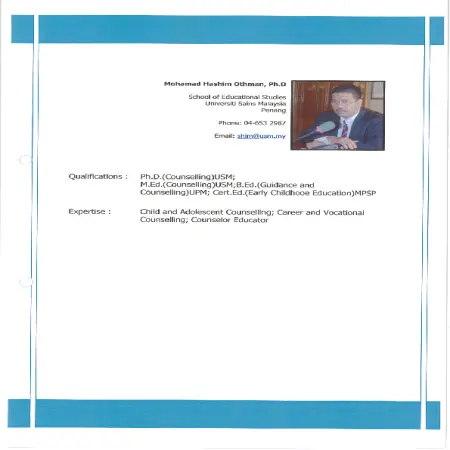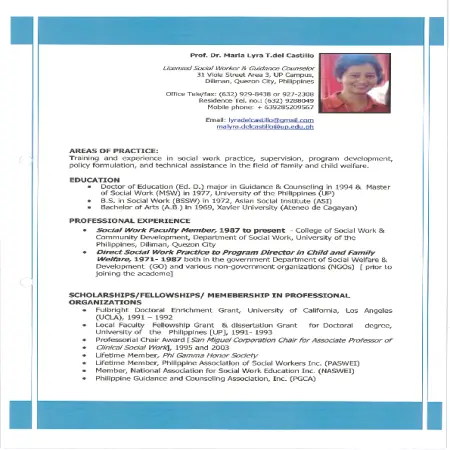Browse by Year
Results for Year : "2009"
|
|
Families resilience and children and families of low income: maximizing opportunities through PERMATA ECEC Program
Item Type: Conference or Workshop Item
Editor:
Year: 00/00/2009
Abstract: PERMATA Early Childhood Education and Care (ECEC) Program in Malaysia was launched on the basis of evidence from research and practice which illustrates that early intervention through high quality program enhances children's social, emotional, spiritual, physical, and cognitive development. PERMATA is a child-focused, community integrated program with the overall goal of increasing school readiness in young children in low-income families, particularly in deprived areas. Despite its various learning outcomes, ECEC main underpinning goal is to produce generations of youth who are able to manage and regulate emotion, possess high EQ skill, and resillient in facing different challenges in life. Its long-term effect can be better understood as children develop into responsible citizens who will take a much more positive role in the society and are free of social ills that now seem to beset the country. This paper presents some strategies of best practices that have been applied in this program to foster and instill resilience in children mainly, increasing caring relationship, developing social competence, encouraging, self-help skills, create partnerships with family and community, and awareness of the existence and supremacy of God.
|
|
|
|
|
|
Family functioning and child well-being amongst urban Malay single mother families: resilence despite challenges
Item Type: Conference or Workshop Item
Editor:
Year: 00/00/2009
Abstract: This study was designed to determine the contribution of risk and protective factors in predicting urban Malay single mother's family functioning and child well being. In addition, this study examine the moderating role of protective factors (risk x protective factor interaction) on the relationship between risk factors and family functioning and child well-being. Result highlight the role of protective factors in promoting better family functioning and child well-being and the extent to which protective factor buffer risk factors in the design of intervention aimed at strengthening family functioning and enhancing child well-being in urban Malay single mother families.
|
|
|
|
|
|
Factors contributing to resilient attitude formation among excellent children from low SES single parent family
Item Type: Conference or Workshop Item
Editor:
Year: 00/00/2009
Abstract: The present study aims to identify the factors that contribute to resilient attitude formation among children who scored excellent results in UPSR. This study used a descriptive research design (Issac, 1995; Kerlinger, 1979). Samples were selected using purposive sampling since the study is only limited to single parent's family from low sosio-economic status (SES). Samples consisted of low SES single parents (mothers) from rural areas. This study was carried out in two phases; (i) structed interview with single parents (n=15) and (ii) handing out questionnaires and interviewing children (boys, n=6 and girls, n=9). The researcher has divided the interview into two types, namely the unstructured interview and the structured interview. Samples were interviewed and their stories were analyzed using the constant comparative method. Transcript data were coded and analyzed using the grounded theory approach (Strauss & Corbin, 1998). Recurring words, phrases and themes in the transcripts were coded commonalities and contradictions within and among the interviews were noted. While constantly comparing the data, themes and meanings were analyzed to develop theoretical, interpretations and implications of the data. After the data had been analyzed, results were compared with the literature to determine the degree to which the findings confirmed prior research.
|
|
|
|
|
|
Families exposed to poverty-asssociated and parent effectiveness service
Item Type: Conference or Workshop Item
Editor:
Year: 00/00/2009
Abstract: Economic problem ranks highest as a source of family stress among the poor families which are often addressed with functional coping activities such as borrowing money, getting extra job or overtime work. Frequently, loans are availed of from relatives, employer or co-employees, friend and "5-6" lenders. Oftentimes, earning children and close relatives offer support or are tapped in times of financial crisis. Likewise, there is a thin line interfacing economic problem with situational and relationship stressors such as spouse having vices of drinking alcohol, misunderstanding about house rules and differences in discipline children, spouse's in difference; children misbehaviour, work related pressures and wife's nagging and etc. by and large, these families exposed to proverty-associated risks still value family life and spirituality tend to permeate their response towards difficulties. Efforts at addressing the socio-economic conditions and other concomitant problems of these families should be seen within the family framework. In this context, Parent Effectiveness Service (PES) is being implemented by an NGO in six (6) poor villages in a rural area in the Philippines alongside with other service. The main reference for the conduct of parent effectiveness sessions is the Manual on Effective Parenting developed by Department of Social Welfare and Development (DSWD) and UNICEF Philippines. Each module was written with the end-in-view of what Filipino parents need to know to better preserve the family. Despite the slow implementation, there are promising signs thet PES can serve as a preventive program that builds and strengthen the families to transcend proverty-associated risks when facilitated by professional helpers, specifically the field social workers. Awareness and raising the consciousness of parents on their role in childs socialization and it's implication to upholding society's convictions, values systems and norms are necessary in achieving a wholesome family and community life. Moreover, it is also a venue to identify and assess family functioning that may need imperative and appropriate social work intervention. Thus, interventions for children and the youth, women and the elderly should be within the framework of a family orientation to ensure integration rather than fragmentation of program efforts.
|
|
|
|








